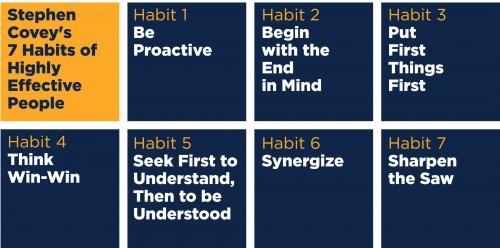Sad News on Monday: author, educator and visionary Stephen Covey died at the age of 79. His death was the result of residual effects of an April bicycle accident.
As I’m sure all of you know, “The 7 Habits of Highly Effective People” is one of the most widely recognizable books of the past — what? — three decades. Since its release in 1989, 7 Habits has sold 25 million books and was named one of the most influential management books by Time and Forbes magazines. The 7 Habits audio book is also the best-selling nonfiction audio in history. Pretty amazing, right? Oh, and there’s more, Covey is among one of the esteemed people to have been named one of Time magazine’s 25 most influential Americans.
According to his biography, Covey “made teaching principle-centered living and principle-centered leadership his life’s work.”
Below is a summary of his world-famous 7 Habits of Highly Effective People:
Independence, i.e., self mastery:
- Habit 1: Be Proactive by taking responsibility for your choices and the consequences that follow. Proactive people recognize that they are “response-able.” A proactive person uses proactive language–I can, I will, I prefer, etc
- Habit 2: Begin with the End in Mind This habit is based on imagination–the ability to envision in your mind what you cannot at present see with your eyes. It is based on the principle that all things are created twice. There is a mental (first) creation (Habit 2), and a physical (second) creation (Habit 3).
- Habit 3: Put First Things First. This habit is where Habits 1 and 2 come together. Prioritize, plan, and execute your week’s tasks based on importance rather than urgency. Habit 3 is about life management as well–your purpose, values, roles, and priorities. What are “first things?” First things are those things you, personally, find of most worth.
Interdependence, i.e., working with others:
- Habit 4: Think Win-Win Genuinely strive for mutually beneficial solutions or agreements in your relationships. Win-win sees life as a cooperative arena, not a competitive one. Win-win is a frame of mind and heart that constantly seeks mutual benefit in all human interactions. Win-win means agreements or solutions are mutually beneficial and satisfying. Being Win-Win is a balancing act between courage and consideration. To go for win-win, you not only have to be empathic, but you also have to be confident. You not only have to be considerate and sensitive, you also have to be brave.
- Habit 5: Seek First to Understand, Then to be Understood Use empathic listening to be genuinely influenced by a person, which compels them to reciprocate the listening and take an open mind to being influenced by you. This creates an atmosphere of caring, respect, and positive problem solving.
- Habit 6: Synergize. Synergy means “two heads are better than one.” Synergize is the habit of creative cooperation. It is teamwork, open-mindedness, and the adventure of finding new solutions to old problems. But it doesn’t just happen on its own. It’s a process, and through that process, people bring all their personal experience and expertise to the table. the strengths of people through positive teamwork, so as to achieve goals no one person could have done alone. Get the best performance out of a group of people through encouraging meaningful contribution, and modeling inspirational and supportive leadership.
Self Renewal
- Habit 7: Sharpen the Saw means preserving and enhancing the greatest asset you have–you. It means having a balanced program for self-renewal in the four areas of your life: physical, social/emotional, mental, and spiritual. As you renew yourself in each of the four areas, you create growth and change in your life. Feeling good doesn’t just happen. Living a life in balance means taking the necessary time to renew yourself. It’s all up to you. You can renew yourself through relaxation. Or you can totally burn yourself out by overdoing everything. You can pamper yourself mentally and spiritually. Or you can go through life oblivious to your well-being. You can experience vibrant energy. Or you can procrastinate and miss out on the benefits of good health and exercise. You can revitalize yourself and face a new day in peace and harmony. Or you can wake up in the morning full of apathy because your get-up-and-go has got-up-and-gone. Just remember that every day provides a new opportunity for renewal–a new opportunity to recharge yourself instead of hitting the wall. All it takes is the desire, knowledge, and skill.
What a major Silver Lining, huh? I read this book years ago, but writing this post is a beautiful reminder of these seven steps to live a full, productive, healthy and balanced life…which is the ultimate Silver Lining!



I am sorry to hear about the death of Stephen Covey. Such an amazing legacy he has left the world! Your post is a gentle reminder of the "effectiveness" of his 7 steps. Thank you for another lovely post!
Kim
Thank you for your comment, Kim. He has indeed left an amazing legacy….major Silver Lining!
Hollye,
While all of your posts are inspiring and informative, today's could
not have been more perfect and timely for me, personally. This morning
I was searching for a way to offer encouragement and support to a beloved,
young niece and you gave me a gift with your and Stephen Covey's words.
Thank you, Linda
Dear Linda,
Thank you so much for your note and kind words. I'm thrilled to hear that this post will help your niece.
Take good care!
Hollye
A truly amazing man with such incredible insight into human nature and the ways in which we can work most effectively. A loss for all.
Indeed, Ellie. You're so right. Thank you for your comment!